Key takeaways:
- Establishing healthy boundaries is essential for maintaining personal well-being while effectively supporting others.
- Open communication about limits fosters mutual respect and strengthens team dynamics in volunteer settings.
- Regular self-reflection helps adjust boundaries and ensures that volunteers do not overextend themselves, preserving their passion for helping others.
- Setting and communicating boundaries, especially in tough situations, is a sign of strength and crucial for long-term sustainability in volunteer roles.
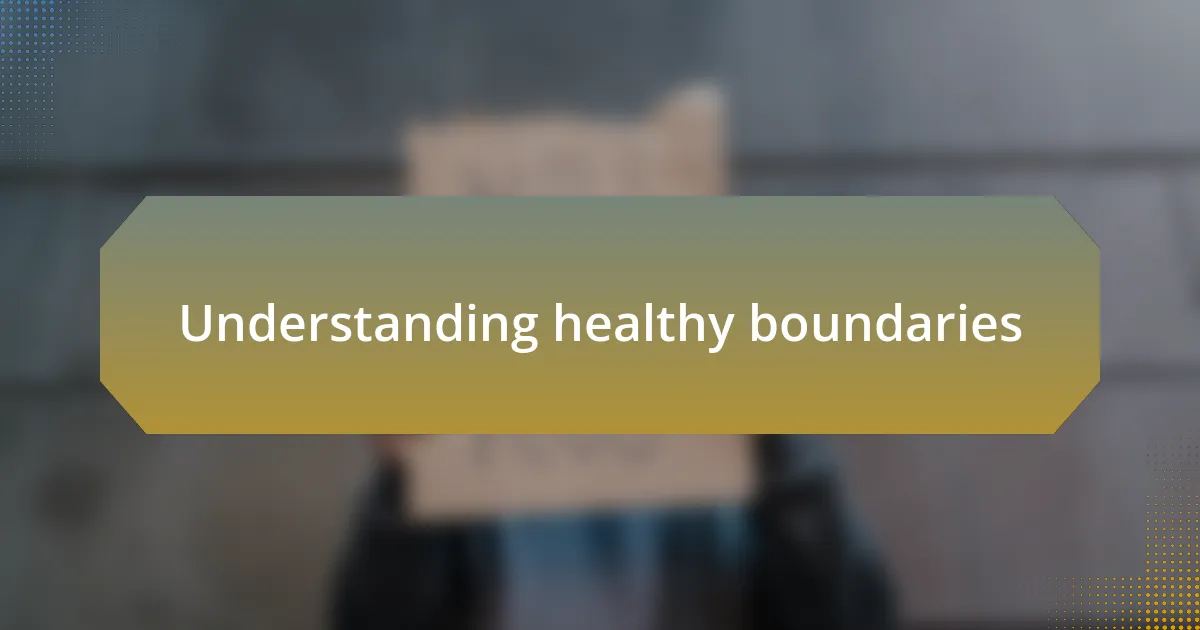
Understanding healthy boundaries
Understanding healthy boundaries involves recognizing what you need to maintain your well-being while also acknowledging the needs of others. I remember a time when I was overwhelmed by the emotional demands of the people I was helping at the charity. It made me question, how much was too much? Those moments taught me that it’s okay to step back and take care of my own mental health first.
Bouncing ideas off others helps clarify boundaries, but not everyone understands that healthy limits can lead to more sustainable relationships. In my experience, having an open conversation about what feels comfortable can be liberating. When I started voicing my limits, I noticed that others felt encouraged to share their boundaries too, fostering a sense of mutual respect.
It’s essential to reflect on your feelings and determine what is acceptable for you. For instance, when I found myself emotionally drained after hours of volunteering, it became clear that I had to establish a stop time for my engagement. Have you ever felt that tug-of-war between wanting to help and preserving your own energy? Realizing that setting boundaries is not selfish, but rather an essential part of ensuring I can continue to support others effectively was a fundamental breakthrough for me.
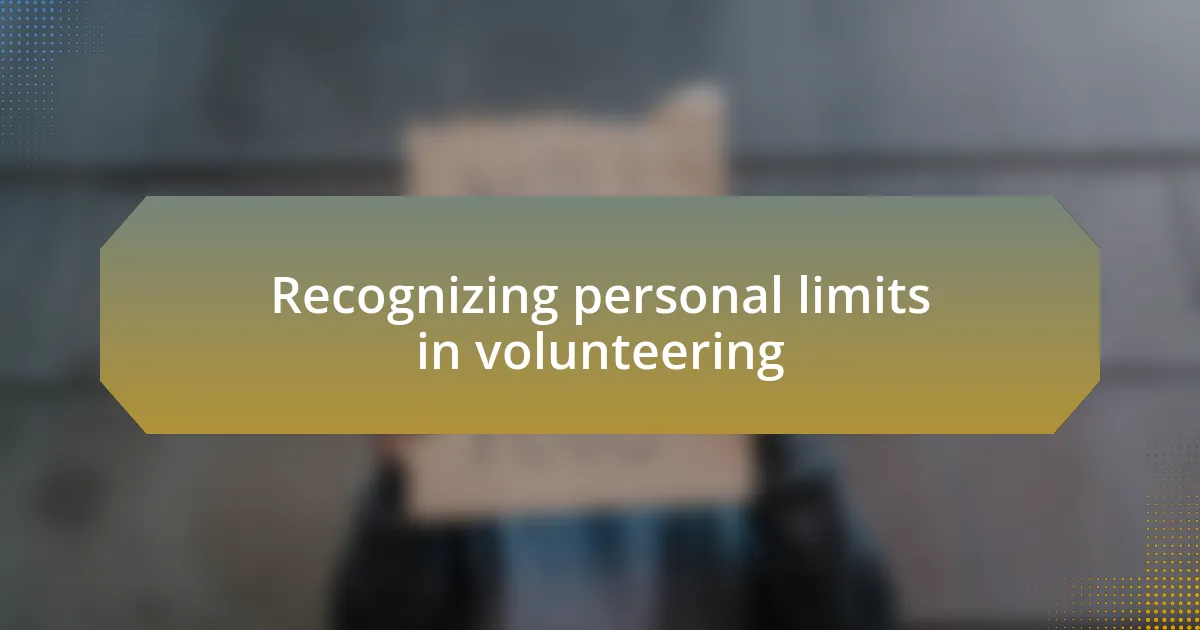
Recognizing personal limits in volunteering
While I genuinely enjoy volunteering and connecting with people, I’ve come to understand the importance of recognizing my limits. One evening, I enthusiastically agreed to organize a fundraiser, but as the weeks passed, the stress piled up. I found myself questioning whether I was truly able to give my best, which made me realize that sometimes stepping back is a sign of strength, not weakness.
In another instance, I volunteered to mentor individuals but quickly felt the emotional toll weighing on me. It was tough to admit, but I knew I couldn’t be an effective mentor if I was dragging myself through each session. Has anyone else felt the guilt of taking a break? I’ve learned that acknowledging those feelings is crucial. By establishing time frames for my volunteer commitments, I safeguarded my energy and maintained my enthusiasm.
Every volunteer has their breaking point, and recognizing that can be eye-opening. I remember a day spent serving meals when a sudden sense of fatigue hit me, and I realized I had neglected my own needs. Sometimes, we get so caught up in the desire to help that we forget that caring for ourselves allows us to provide better support to others. It’s about finding that balance, which can be challenging but ultimately rewarding.
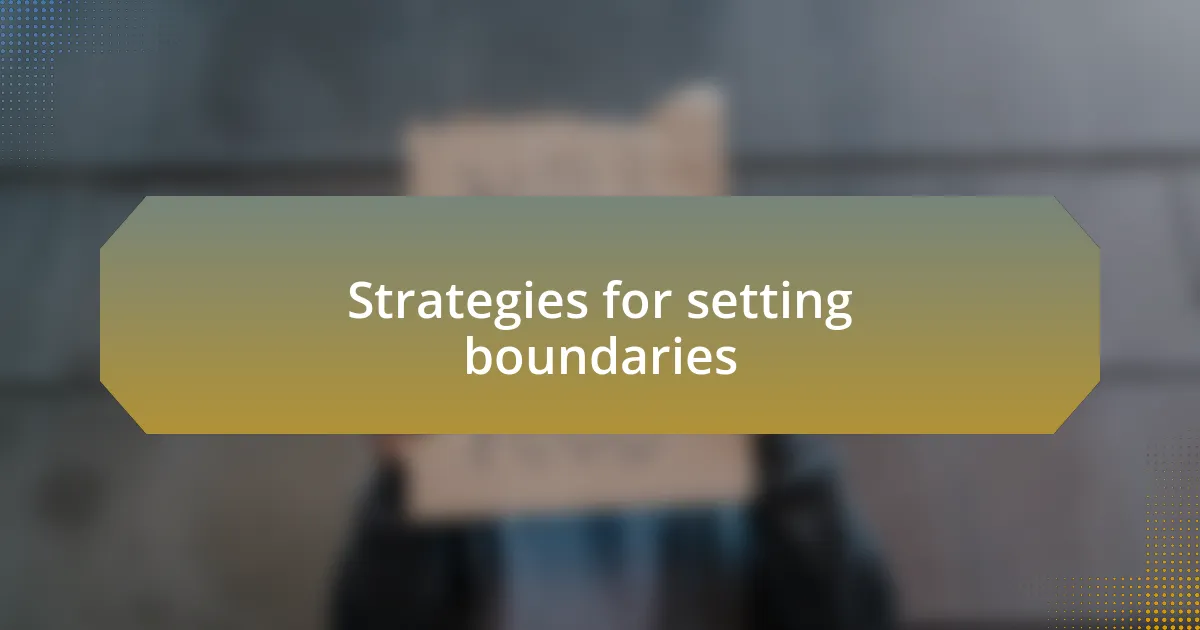
Strategies for setting boundaries
One effective strategy I’ve found for setting boundaries is to communicate openly about my limits with the people I work with. For instance, I remember a time when I expressed to my fellow volunteers that I needed to step back from certain tasks due to personal commitments. It was a relief to share my struggles, and the understanding and support I received in return made it clear that boundaries don’t just protect me—they strengthen our team dynamic.
Creating specific guidelines for my interactions also greatly aids in establishing boundaries. Early in my volunteering journey, I realized I had to restrict how often I could meet with individuals I was mentoring. I decided on a fixed schedule, which not only helped manage my time but also allowed those I volunteered with to know what to expect. This clarity made our meetings more productive and enjoyable. Doesn’t having a clear framework sound empowering?
Lastly, I find it helpful to check in with myself regularly. I ask myself questions like, “Am I feeling overwhelmed?” or “Am I still excited about this project?” This self-reflection keeps me attuned to my needs. I recall a moment when I ignored those feelings and ended up exhausted, which affected my ability to help others. By taking time for self-assessment, I can adjust my boundaries as needed, maintaining my passion for volunteering while ensuring I don’t overextend myself.
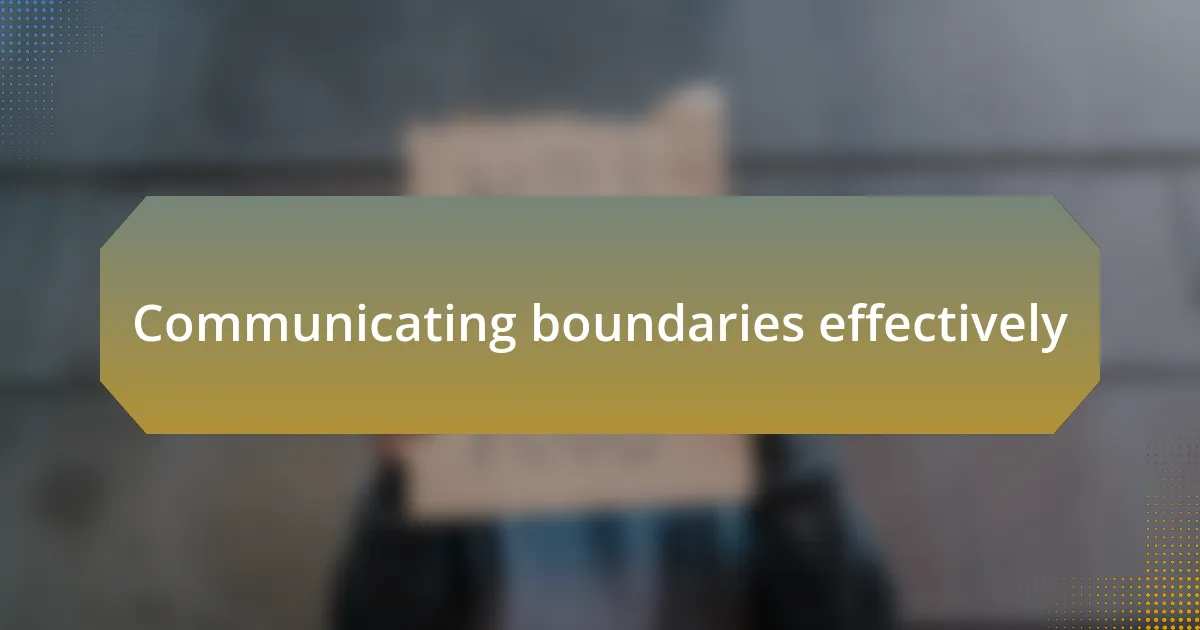
Communicating boundaries effectively
Communicating boundaries effectively requires clarity and honesty about your feelings. I recall a situation where I had to express to a colleague that I couldn’t take on any additional responsibilities during a busy period. It felt daunting, but when I filled that conversation with authenticity, not only did I feel a weight lift off my shoulders, but we also found a way to redistribute tasks that honored everyone’s limits. Isn’t it refreshing when open dialogue leads to a win-win situation?
Another essential aspect is understanding the other person’s perspective. Once, a fellow volunteer seemed taken aback when I mentioned needing more time for my own mental well-being. I took the opportunity to explain my feelings, and what resulted was an empathetic discussion where we shared our struggles. It was eye-opening to realize that vulnerability could deepen connections. Have you ever noticed how being open can shift the dynamic in a conversation?
Lastly, follow-up conversations after setting boundaries have proven invaluable. There was a time when I spoke to a group about my availability, and a few weeks later, I checked in to see how everyone felt about it. The responses varied, and it sparked a great discussion about expectations and needs. It made me appreciate the fluid nature of communication; boundaries aren’t rigid! Instead, they can evolve as we continue to engage with one another. How often do you revisit and reassess your own limits?
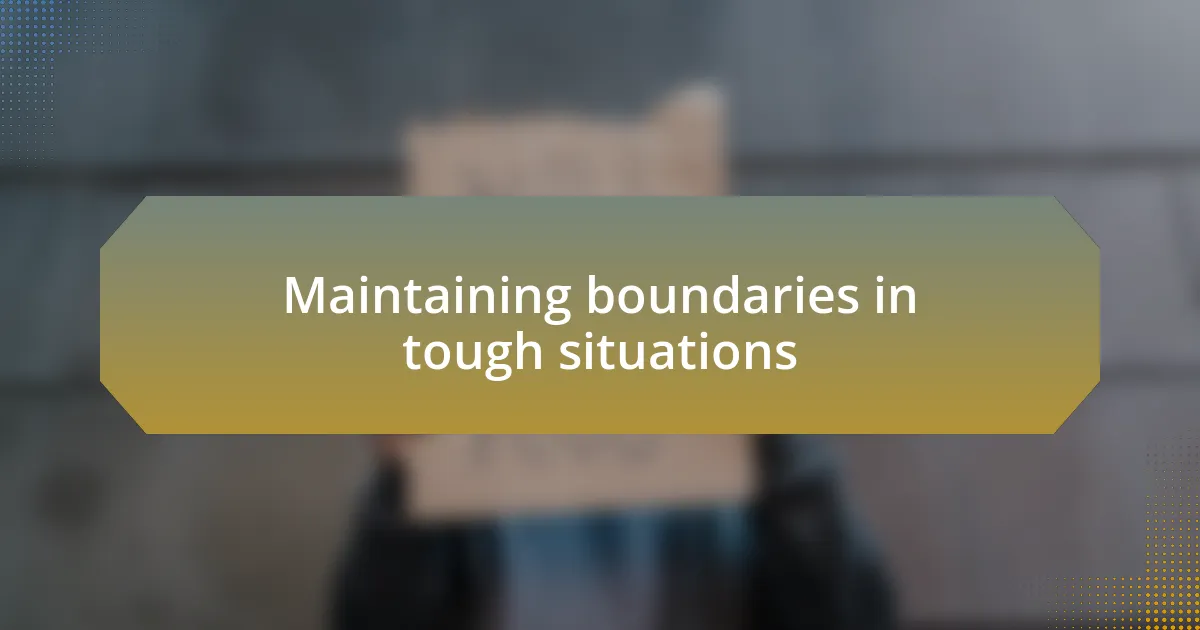
Maintaining boundaries in tough situations
Maintaining boundaries in tough situations can be particularly challenging yet profoundly necessary. I remember volunteering at a shelter one winter, where the emotional weight of the environment often felt overwhelming. There was a moment when I had to step back and remind myself that helping others shouldn’t come at the cost of my mental health. How do you balance your well-being with the demands around you?
During one particularly intense day, a client reached out to me in distress, and I felt the urge to drop everything to help immediately. However, I had learned the hard way that stepping back and offering support later—when I was mentally prepared—actually allowed me to serve them better. It made me ponder: might delaying my response bring clarity and strength to my approach?
Setting boundaries also means being prepared to enforce them against the tide of external pressures. I still recall a situation where I had to assert my need for a break during an event. Some people were visibly upset, but in the end, they respected my choice when I explained that my ability to support others hinged on taking care of myself first. Have you found that your well-being often becomes the foundation for you to help others effectively?
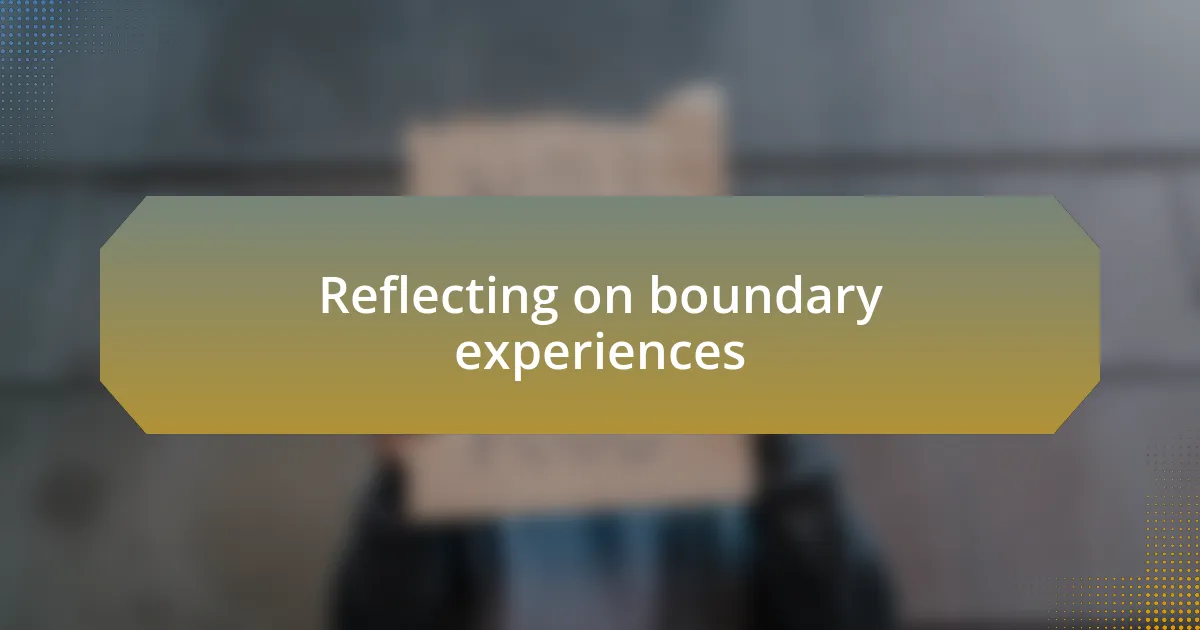
Reflecting on boundary experiences
Reflecting on my boundary experiences often takes me back to a time when I was overwhelmed by the stories of those I encountered. I vividly recall a moment of vulnerability when a client shared their struggles, and my heart ached for them. In that instant, I realized that absorbing their pain would do neither of us any good. How could I truly help if I lost myself in their narrative?
There was also a particular instance when I witnessed colleagues struggle to maintain their boundaries. One night, a friend confessed feelings of guilt for not doing enough. It struck me that recognizing our limits is a form of self-respect. I wondered, is it possible that acknowledging our boundaries can lead to more meaningful connections and support for those in need?
As I think back, I recognize that each boundary I set was a lesson in self-care. One day, I chose to leave the shelter early after a long shift, despite feeling torn. That choice not only rejuvenated me but also allowed me to return the next day with a clearer mindset and renewed energy. Perhaps the most important question to ask is: does honoring our boundaries not empower us to uplift others more effectively?